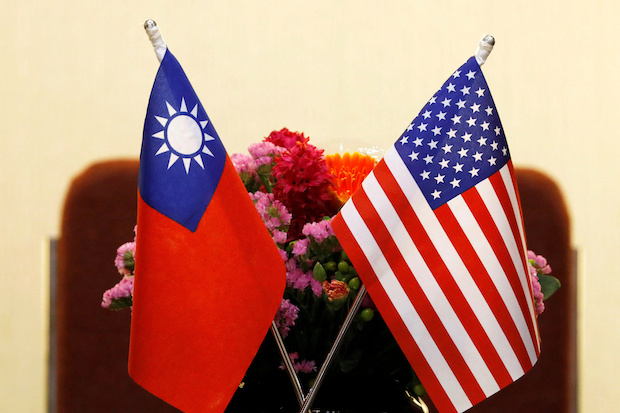Biden sends former top defense officials to Taiwan in show of support

Flags of Taiwan and US are placed for a meeting between US House Foreign Affairs Committee Chairman Ed Royce speaks and with Su Chia-chyuan, President of the Legislative Yuan in Taipei, Taiwan March 27, 2018. (REUTERS/Tyrone Siu/File Photo)
WASHINGTON — US President Joe Biden will send a delegation of former senior defense and security officials to Taiwan on Monday, a senior official of his administration said, a sign of support for the island claimed by China after Russia’s invasion of Ukraine.
The visit, led by one-time chairman of the Joint Chiefs of Staff Mike Mullen, comes at a time when Taiwan has stepped up its alert level, wary of China taking advantage of a distracted West to move against it.
Beijing claims the democratically governed island as its own and has vowed to bring it under Chinese control, by force if necessary.
Mullen, a retired Navy admiral who served as the top U.S. military officer under former presidents George W. Bush and Barack Obama, will be accompanied by Meghan O’Sullivan, a former deputy national security advisor under Bush, and Michele Flournoy, a former undersecretary of defense under Obama, according to the official, who spoke on the condition of anonymity.
Two former National Security Council senior directors for Asia, Mike Green and Evan Medeiros, will also make the trip, which is intended to “demonstrate our continued robust support for Taiwan,” the official told Reuters.
Article continues after this advertisementThe delegation is expected to arrive in Taiwan on Tuesday afternoon and stay until Wednesday evening, during which time they plan to meet Taiwan’s President Tsai Ing-wen, Defense Minister Chiu Kuo-cheng, and other senior officials.
Article continues after this advertisementTaiwan’s presidential office confirmed the visit and meeting with Tsai, saying that timing it during the Ukraine crisis showed Taiwan-US ties were “rock solid.”
The US official declined to say whether the timing of the visit was influenced by Russia’s invasion of Ukraine.
Taiwan said last week that former US Secretary of State Mike Pompeo, who served under former President Donald Trump, would visit from March 2-5 and meet Tsai.
The Biden administration has declined to comment on Pompeo’s visit, calling him a private citizen.
Referring to the delegation led by Mullen, the senior administration official said: “The selection of these five individuals sends an important signal about the bipartisan US commitment to Taiwan and its democracy, and demonstrates that the Biden administration’s broader commitment to Taiwan remains rock solid.”
The official added that Washington would regard “any effort to determine the future of Taiwan by other than peaceful means a threat to the peace and security of the Western Pacific.”
“The United States will maintain the capacity to resist any resort to force or other forms of coercion that would jeopardize the security or the social or economic system of the people of Taiwan,” the official said.
Mullen’s delegation marks the first public visit of a group of former officials to Taiwan at Biden’s behest since April 2021, when former US Sen. Chris Dodd and former Deputy Secretaries of State Richard Armitage and James Steinberg traveled there and met with Tsai, who Beijing accuses of seeking independence.
The latest trip comes days after a US warship sailed through the sensitive Taiwan Strait, the waterway between China and Taiwan. The US military described its passage as routine but Beijing said it was “provocative.”
The White House on Sunday called on China to condemn Russia’s invasion of Ukraine.
But Beijing has largely steered clear of criticizing Moscow after Russian President Vladimir Putin and China’s leader Xi Jinping announced an enhanced strategic partnership aimed at countering US influence just weeks before the invasion.
Under long-standing US policy, Washington has only unofficial relations with Taipei and recognizes Beijing diplomatically. However, US law requires it to provide Taiwan with the means to defend itself and the Biden administration has vowed to continue Trump’s and Pompeo’s policy of stepping up engagement with the island.
Russia’s attack on Ukraine has given added impetus to a growing debate about the longstanding and controversial U.S. policy of “strategic ambiguity,” under which Washington refuses to say explicitly whether it will defend Taiwan militarily in the event of a Chinese attack.
Some US lawmakers, including the Democratic chairman of the influential House Intelligence Committee Adam Schiff, have urged greater clarity about the US “obligation” to defend Taiwan amid stepped-up Chinese military pressure, but proponents of existing policy say this could worsen the risk of conflict.
China’s ambassador to Washington said in January the two superpowers could end up in a military conflict if Washington encourages Taiwan’s independence.
RELATED STORIES
China says US warship sailing in Taiwan Strait ‘provocative’
Taiwan warns Chinese aircraft in its air defense zone